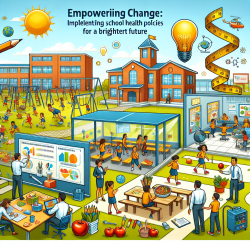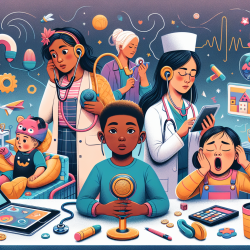Introduction
Volunteerism and humanitarian efforts have long been recognized as vital components in addressing global health disparities. While traditionally associated with medical fields such as surgery, these efforts are equally critical in the realm of speech-language pathology (SLP), particularly in enhancing child outcomes. The research article "Volunteerism and Humanitarian Efforts in Surgery" by Pezzella (2007) provides a comprehensive overview of global voluntary humanitarian projects, offering valuable insights that can be translated into the field of SLP.
The Role of Volunteerism in Speech-Language Pathology
Volunteerism in SLP can significantly contribute to addressing the communication needs of underserved populations, especially children in remote or resource-limited settings. By applying the findings from Pezzella's research, SLP practitioners can improve their skills and expand their impact through data-driven decisions and strategic volunteerism.
Data-Driven Approaches to Volunteerism
Data-driven approaches are essential in maximizing the impact of volunteer efforts. By analyzing developmental indicators and health access disparities, SLP practitioners can identify regions and populations where their expertise is most needed. For instance, regions with high infant mortality rates and low access to health services can benefit from targeted SLP interventions.
Implementing Effective Volunteer Strategies
- Needs Assessment: Conduct thorough assessments to identify specific communication disorders prevalent in target populations.
- Collaboration: Partner with local healthcare providers and educational institutions to integrate SLP services into existing health frameworks.
- Training and Education: Provide training for local practitioners to ensure sustainable SLP services beyond the volunteer period.
- Technology Utilization: Leverage online platforms, such as those offered by TinyEYE, to provide remote therapy services, ensuring continuous support.
Encouraging Further Research
SLP practitioners are encouraged to engage in further research to evaluate the effectiveness of volunteer interventions and to develop innovative approaches tailored to specific community needs. By contributing to the body of knowledge, practitioners can advocate for policy changes and increased support for SLP services globally.
Conclusion
Volunteerism in speech-language pathology, when guided by data-driven decisions and strategic planning, can lead to significant improvements in child outcomes. By implementing the insights from Pezzella's research, SLP practitioners can enhance their skills and make a meaningful impact in underserved communities. To read the original research paper, please follow this link: Volunteerism and Humanitarian Efforts in Surgery.










